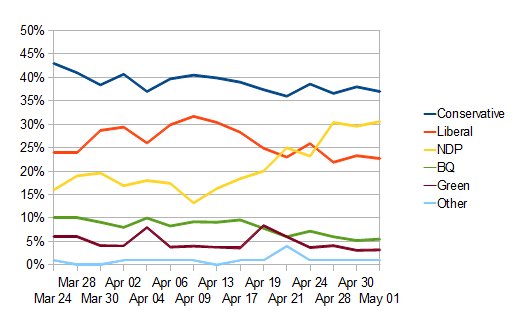I first posted this article in 2004. I repost it every election:
Ballot Box Irregularities, Canadian Style
This article in Reason Hit and Run talks about the recent decision to allow partisan ballot-challengers to monitor the voting in Ohio. In Canada, these people are called “scrutineers” and they have a vital job.
No, I’m not kidding about the vital part. Each candidate has the right to appoint a scrutineer for every poll in the riding (usually only the Liberal, NDP, and Conservative parties can manage to field that much manpower). I was a scrutineer during a federal byelection in the mid-1980’s in a Toronto-area riding, but I had five polls to monitor (all were in the same school gymnasium). This was my first real experience of how dirty the political system can be.
The scrutineers have the right to challenge voters — although I don’t remember any challenges being issued at any of my polls — similar to the Ohio situation, I believe. They also have the right to be present during the vote count and to challenge the validity of individual ballots. Their job is to maximize the vote for their candidate and minimize the vote for their opponents.
Canadian ballots are pretty straightforward items: they are small, folded slips of paper with each candidate’s name listed alphabetically and a circle to indicate a vote for that candidate. A valid vote will have only one mark inside one of the circles (an X is the preferred mark). An invalid vote might have:
- No markings at all (a blank ballot)
- More than one circle marked (a spoiled ballot)
- Some mark other than an X (this is where the scrutineers become important).
After the polls close, the poll clerk and the Deputy Returning Officer (DRO) secure the unused ballots and then open the ballot box in the presence of any accredited scrutineers. The clerk and DRO then count all the ballots, indicating valid votes for candidates and invalid ballots. The scrutineers can challenge any ballot and it must be set aside and reconsidered after the rest of the ballots are counted.
A challenged ballot must be defended by one of the scrutineers or it is considered to be invalid and the vote is not counted. The clerk and DRO have the power to make the decision, but in practice a noisy scrutineer can usually bully the DRO into accepting all their challenges. I didn’t realize just how easy it was to screw with the system until I’d been a scrutineer and watched it happen over and over again.
This is the key reason why minor party candidates poll so badly in Canadian elections: they don’t have enough (or, in many cases, any) scrutineers to defend their votes. In my experience in that Toronto-area byelection, I personally saved nearly 4% of the total vote my candidate received (in the entire riding) by counter-challenging challenged ballots. We totalled just over 400 votes in the riding (in just about 100 polls) — 21 of them in my polls. I got 15 of those votes allowed, when they would otherwise have been disallowed by the DRO.
There was no legal reason to disallow those votes: they were clearly marked with an X and had no other marks on them; they were challenged because they were votes for a minor candidate. As it was, I had a heck of a time running from poll to poll in order to get my counter-challenges in (I probably missed a few votes by not being able to get back to a poll in time).
The Libertarians only had six or seven scrutineers, covering less than a third of the polls in this riding. If the challenge rate was typical in my poll, then instead of the 400-odd votes, we actually received nearly 2000 votes — but most of them were not counted.
Yes, even 2000 votes would not have swung the election, but 2000 people willing to vote for a “fringe” party would be a good argument against those “throwing away your vote” criticisms. Voters are weird creatures in some ways: they like to feel that their votes actually matter. Voting for someone who espouses views you like, then discovering that only a few others feel the same way will discourage most voters from voting that way again in future.
Another reason that minor party votes matter (that I neglected to mention in the original post) is that parties receive funding based on their vote totals in the previous election. Disallowing minor party votes also deprives those parties of the funding they would otherwise be entitled to next time around. For the bigger parties, this is trivial, but for minor parties, this may be critical to them being able to stay active — and visible to voters — between elections.

 Click thumbnail to view full size table
Click thumbnail to view full size table


